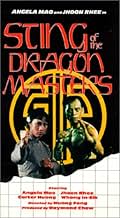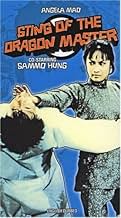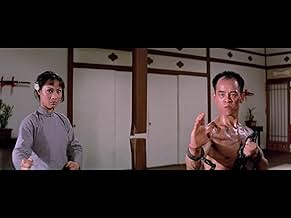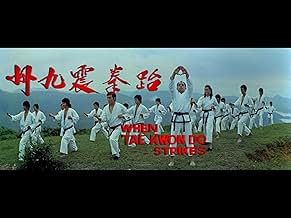Füge eine Handlung in deiner Sprache hinzuDuring the Japanese occupation of Korea in the 1930's, the leader of a small resistance movement attempts to get information to sympathizers in China.During the Japanese occupation of Korea in the 1930's, the leader of a small resistance movement attempts to get information to sympathizers in China.During the Japanese occupation of Korea in the 1930's, the leader of a small resistance movement attempts to get information to sympathizers in China.
Carter Wong
- Jin Zheng Zhi
- (as Carter Huang)
Handlung
WUSSTEST DU SCHON:
- WissenswertesDespite being a Mandarin-language production, four languages were spoken during filming. Most of the cast spoke Mandarin (even westerner Andre Morgan, who was already a multi-lingual producer for Golden Harvest), while Hwang In-Shik and Kim Ki-Joo spoke Korean, Kazuma Kenji spoke Japanese, and Jhoon Rhee & Anne Winton spoke English. Despite being South Korean born (and Korean being his primary language), you can tell Rhee's lip movements more closely match lines from the dub and/or the English subtitles. While it's not known for sure why he spoke English instead of Korean during the production, it may have been to assist when the film would receive its eventual US release/dub, where the majority of his students (especially in the Washington DC area) were located.
- Alternative VersionenThe UK theatrical version was heavily cut to remove the whipping of the priest, as well as substantial cuts to the fight scenes, including blows to head, kicks, chain-fighting, and a man being knocked down the stairs.
- VerbindungenFeatured in The Best of the Martial Arts Films (1990)
Ausgewählte Rezension
STING OF THE DRAGON MASTERS (1973, aka WHEN TAEKWONDO STRIKES) is an unusual kung fu film set largely in Korea during the Japanese occupation in the 1930s and involves an ethnically mixed cast of Chinese, Korean, Japanese and American martial artists. Korean Taekwondo expert Jhoon Rhee plays the leader of the Korean resistance movement and his group includes a Chinese hapkido expert played by Angela Mao, a Korean Taekwondo expert played by Carter Wong, and an American student of the art played by Anne Winton, who has seen her uncle, a Catholic priest, abducted, tortured and finally killed by the Japanese occupying forces. ('The Japs have no respect for religion,' we are told.) A long-haired Samo Hung appears as one of the Japanese karate experts who takes on the heroes in several fights. (He also played a Japanese villain in King Hu's THE VALIANT ONES, 1974.)
The plot centers around the efforts of Rhee to keep his resistance movement alive after being exposed to the Japanese and get a list of his rebel group's members to their contacts in China. This involves lots of fights in the first half of the movie, including at least three in a Catholic church and one in a restaurant. The final battle, pitting the four heroes against the top Japanese villains at the Japanese headquarters in Manchuria, is particularly exciting and filled with great martial arts action.
The film moves quickly and is well shot (on studio sets mixed with actual locations), but suffers from unusually poor English voice dubbing. Worse, the constant stream of inappropriate music cues lifted from other sources is lathered on in the most heavy-handed manner, often drowning out the dialogue. Also, the VHS edition is full frame and severely cropped meaning that much of the fighting action disappears off the sides of the frame.
Even so, the film is worth seeing for the sheer number of superb fights, most of which feature Rhee and Mao taking on the Japanese. Mao is at her peak here and shows off the genuine skills that made her the queen of the kung fu movie for a spell back in the 1970s. The director is Mao's frequent collaborator, Huang Feng, and the movie was produced by Golden Harvest.
ADDENDUM (FEB. 10, 2008): Since writing the above review, this film has come out on DVD, under its original title, WHEN TAEKWONDO STRIKES, from Joy Sales as part of the Fortune Star/Legendary Collection line. The new edition is letter-boxed and in its original language, Mandarin, with English subtitles. The music track is very different and doesn't have the same problems that the soundtrack on the English dub had. Also, the subtitles make it clear that the Catholic priest and his martial artist niece described above are meant to be French, not American. The DVD contains the film's original trailer, which identifies the numerous martial artists cast in the film and their particular specialties. Watching the DVD was like seeing the film for the first time. Highly recommended.
The plot centers around the efforts of Rhee to keep his resistance movement alive after being exposed to the Japanese and get a list of his rebel group's members to their contacts in China. This involves lots of fights in the first half of the movie, including at least three in a Catholic church and one in a restaurant. The final battle, pitting the four heroes against the top Japanese villains at the Japanese headquarters in Manchuria, is particularly exciting and filled with great martial arts action.
The film moves quickly and is well shot (on studio sets mixed with actual locations), but suffers from unusually poor English voice dubbing. Worse, the constant stream of inappropriate music cues lifted from other sources is lathered on in the most heavy-handed manner, often drowning out the dialogue. Also, the VHS edition is full frame and severely cropped meaning that much of the fighting action disappears off the sides of the frame.
Even so, the film is worth seeing for the sheer number of superb fights, most of which feature Rhee and Mao taking on the Japanese. Mao is at her peak here and shows off the genuine skills that made her the queen of the kung fu movie for a spell back in the 1970s. The director is Mao's frequent collaborator, Huang Feng, and the movie was produced by Golden Harvest.
ADDENDUM (FEB. 10, 2008): Since writing the above review, this film has come out on DVD, under its original title, WHEN TAEKWONDO STRIKES, from Joy Sales as part of the Fortune Star/Legendary Collection line. The new edition is letter-boxed and in its original language, Mandarin, with English subtitles. The music track is very different and doesn't have the same problems that the soundtrack on the English dub had. Also, the subtitles make it clear that the Catholic priest and his martial artist niece described above are meant to be French, not American. The DVD contains the film's original trailer, which identifies the numerous martial artists cast in the film and their particular specialties. Watching the DVD was like seeing the film for the first time. Highly recommended.
- BrianDanaCamp
- 2. Aug. 2001
- Permalink
Top-Auswahl
Melde dich zum Bewerten an und greife auf die Watchlist für personalisierte Empfehlungen zu.
Details
- Laufzeit1 Stunde 31 Minuten
- Sound-Mix
- Seitenverhältnis
- 2.35 : 1
Zu dieser Seite beitragen
Bearbeitung vorschlagen oder fehlenden Inhalt hinzufügen

Oberste Lücke
By what name was Tai quan zhen jiu zhou (1973) officially released in Canada in English?
Antwort
































